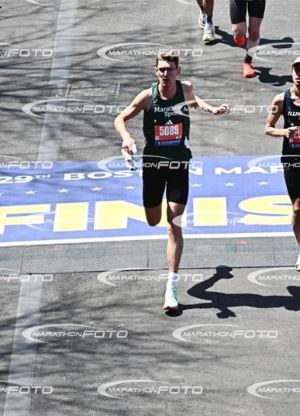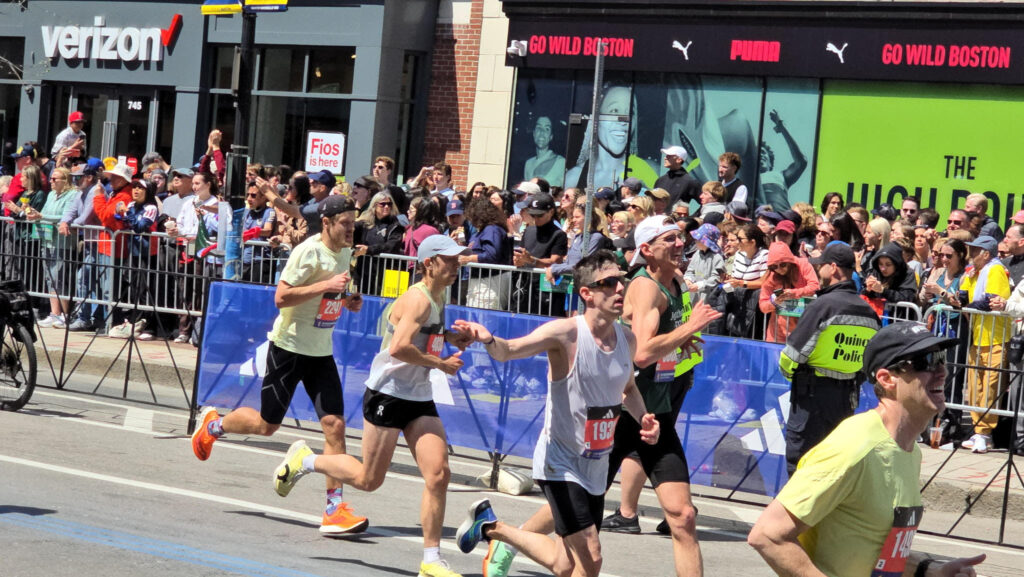I’ll begin with a riddle: What can money not buy you, priviledge not endow, and no one gift? Answer: grit.
Running, like other sports or artistic endeavors, is an avenue of virtue. You can’t make it out the door each day to train without discipline. You can’t tolerate the: most-sobering-bus-ride-of-your-life wait traveling from Boston to Hopkinton, without patience. You can’t pace yourself correctly without humility. Humility comes from the latin origin – Humus – which means ground. There’s actually a soil horizon named humus (As a soil judge I had always wondered what that meant and why, but just rolled with it). Through running, I practice humility by not biting off more than I can chew. Moment to moment in training I practice humility by checking in with myself asking: “Am I biting off more than I can chew?”. If you’re listening you’ll hear an answer. The action you take in response to that answer is the practice of discipline.
I had never prepared for one day of performance more than I had for The 2025 Boston Marathon. After a thrilling 2:41:00 PR (11 min PR) in Richmond 5 months previous, I trained almost every day and averaged 7.5 miles/day for Dec 2024, 9.44 miles/day in January, 10.09 miles/day in February, and a personal record 11.52 miles/day in March, before a 2-week taper cutting training load in preparation for the race on April 21st. Some highlights of my training for Boston were a 20-mile threshold run at 6:11 avg mile pace and a 15 mile threshold run on the track at 5:53 avg mile pace the week after. The day following both of these runs I felt no soreness whatsoever, and given the context that these training runs were completed in the midst of the heaviest training of my life, I was delighted with how I responded to them. Based on these performances, I was excited for a fast race. I believed I could get below 2:40, and likely run around a 2:35.
I anticipated that the net negative downhill quality of the race would only serve to my advantage. I never seriously considered it could have as much of an effect on me as it did. On the same weekend last year, I ran the blue ridge marathon which has its claim to fame of being the most difficult marathon in America due to it’s outrageous 7500′ of elevation change. I remember having a late surge at around 20 miles after the course began to flatten out a bit. I could shift into 5th gear and finish really well. At Boston, after the initial 7ish miles and several hundred feet of elevation loss, I was looking around to find who had strapped me with ankle weights. I kept a strong consistent pace; however, as the race progressed, my uncertainty of a blazing fast PR grew in proportion to the size of those ankle weights.
I came through the half at 1:20:00 and felt not amazing. I knew this was going to be a real challenge. I’ve run enough to extrapolate a finishing time based on the current effort. I knew at my core, it wasn’t going to be my day for that sexy 2:35 I had dreamt of. I accepted this cold truth and began the grueling second half with an adjusted arrival time.
I knew there would be a crossroads during the race where I would have to make a big decision that would be instrumental in determining the result of my performance. The catch is: you don’t know where or when you’ll encounter it. Deciding to modify my desired finish time to accurately match my current situation, was it. At that crossroads, I was verging on biting off more than I could chew. I knew that if I continued, I would find myself dragging lead pianos down boylston, perhaps running 20 minutes longer than I would have liked (or strolling in much much later with a defeated survival shuffle).
It would have been game, set, match Boston marathon 1, Nick 0. Fortunately, I made the right call. I made the humbling decision to control effort, continue in 3rd and 4th gear, and mitigate the rate at which those nice ankle weights grew. I practiced humility to make the call, and discipline to execute the new plan. In spite of this unanticipated obstacle, I learned to smile during the worst points of the race. I chose to cheese as largely as possible at times when I was in the most pain. This is why I run. I run to demonstrate that the worst moments of life can be the most redeeming. I don’t run for any trophy. I run for the grit. I grinded out heartbreak hill with the biggest grin I could muster. I was pulled to the finish line by the tunnel of cheering fans on Boylston street, finishing with a time of 2:43:54. My legs have never known this level of punishment. I am immensely grateful for the love and support of my family and friends who made my success possible. I consider running an individual team sport, and I have the best team. I pray that I may have another opportunity to confront The Boston Marathon and learn more of what it has to teach me.





